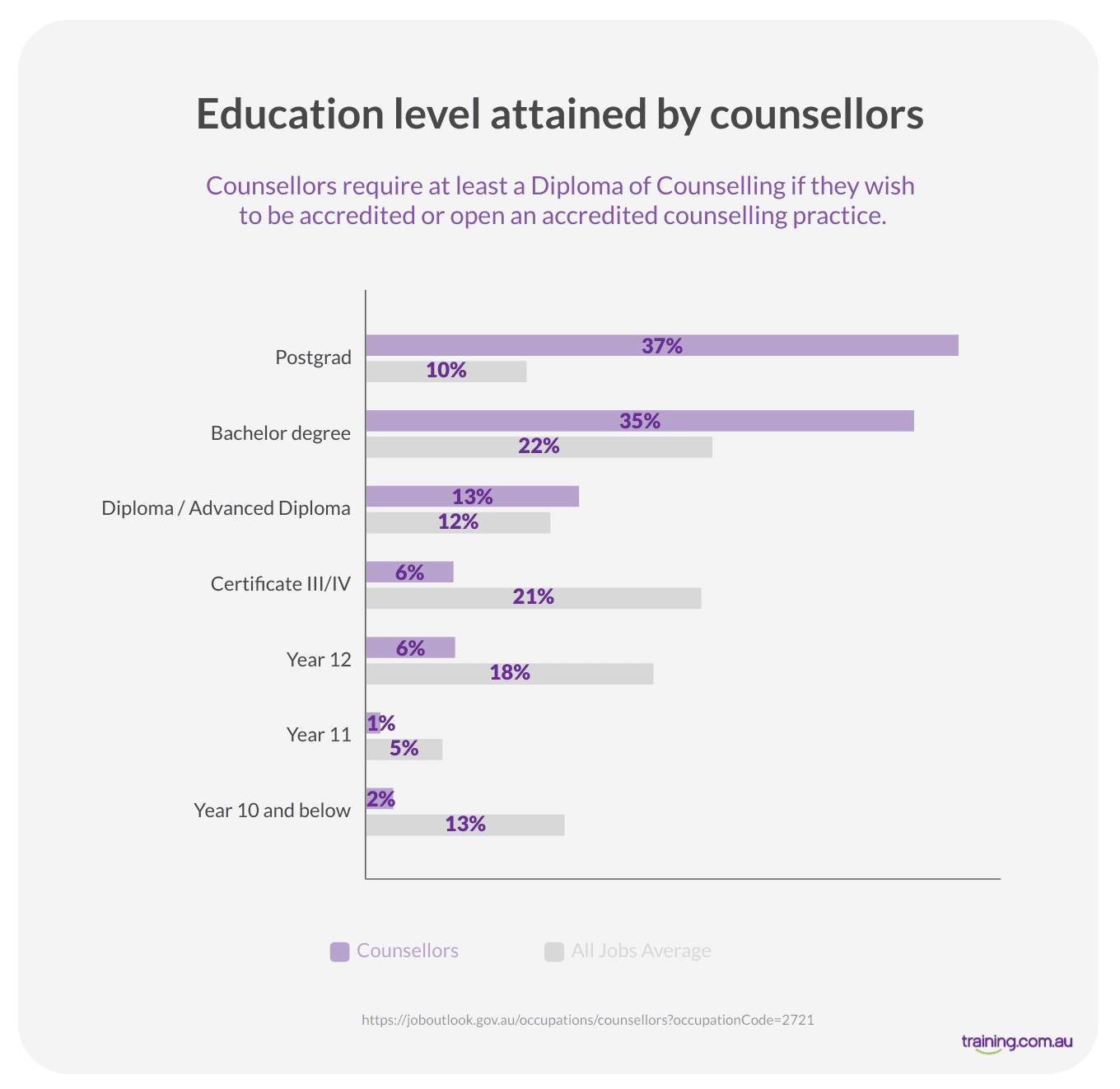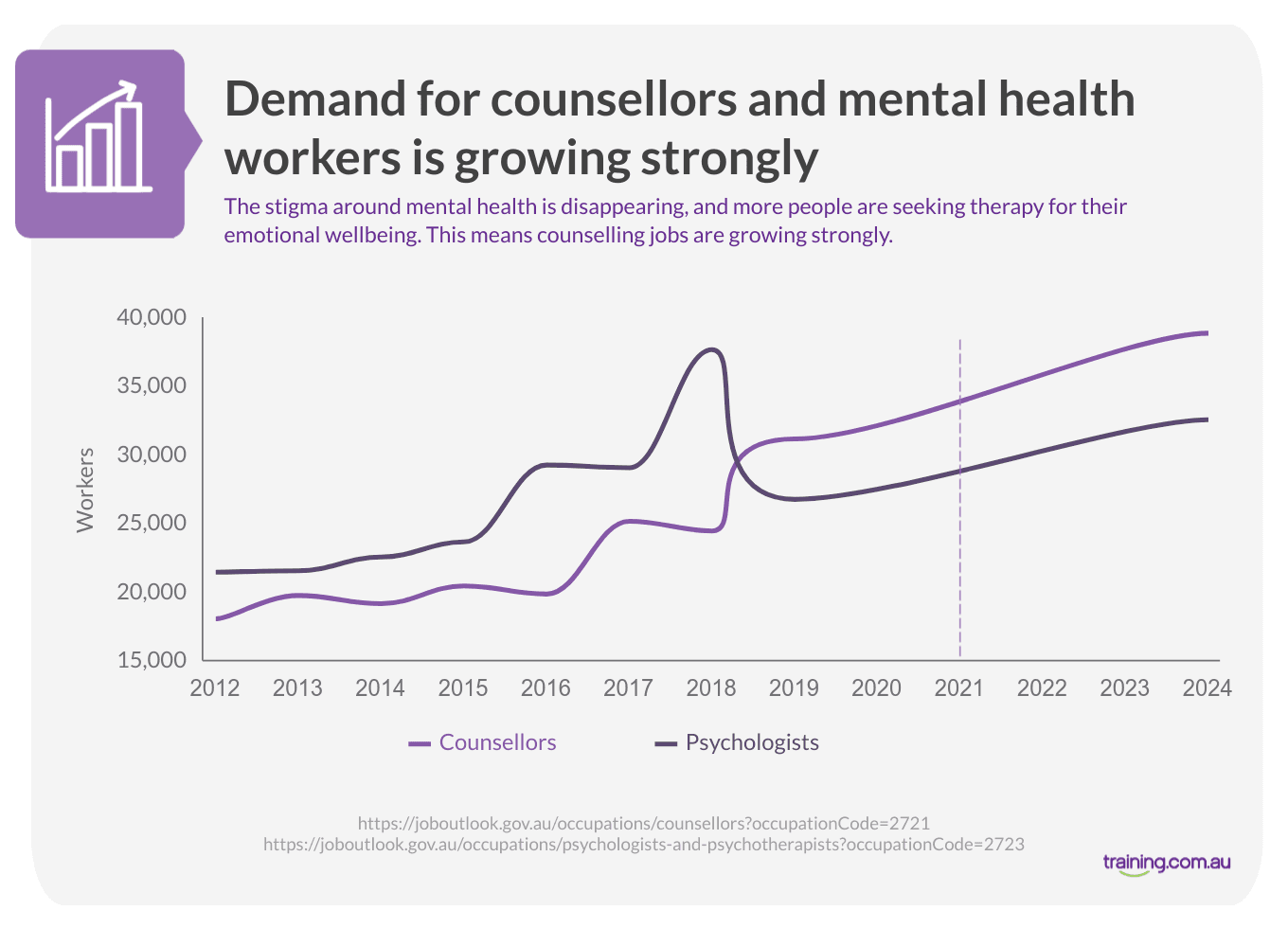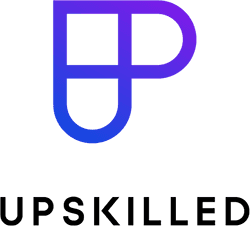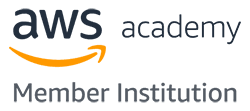In this post
- How to become a counsellor in Australia
- Study relevant counselling qualifications
- Getting professional counselling accreditation in Australia
- Starting your counselling career
- Considering whether a counselling job is for you
- What does a counsellor do?
- How much does a counsellor earn?
- Counselling skills that you need to succeed
- Browse Counselling Results
How to Become a Counsellor in Australia 2024: the Ins and Outs of This Fulfilling Role
In this post Show
- How to become a counsellor in Australia
- Study relevant counselling qualifications
- Getting professional counselling accreditation in Australia
- Starting your counselling career
- Considering whether a counselling job is for you
- What does a counsellor do?
- How much does a counsellor earn?
- Counselling skills that you need to succeed
- Browse Counselling Results
A career in counselling is suited to people who want to support the mental health and wellbeing of others and make a positive difference in people’s lives. Passionate and empathetic counsellors feel rewarded when they see clients tackle challenges in their lives. Counselling in Australia is a much-needed profession that offers strong, well-paying, and flexible employment prospects.
If you’ve been asking yourself: “How do I become a counsellor?” This article has all the answers. From what skills you need, what to study, and what to expect from the counselling industry.
How to become a counsellor in Australia
- Get qualified with a Diploma of Counselling (CHC51015)
- Get professional accreditation by registering with the Australian Counselling Association (ACA) or the Psychotherapy and Counselling Federation of Australia (PACFA)
- Choose an organisation or sector to work in and apply for jobs
Counsellor job description
Counsellors work with clients for short periods of time to help them reflect on and address practical and immediate issues in their lives. These problems could include grief, making difficult transitions (such as a divorce or the birth of a new baby), relationship or career issues, poor self-esteem, and more.
During counselling sessions, counsellors encourage clients to draw and build on their own insights and skills to solve these issues and return to a better state of emotional wellbeing.
Study relevant counselling qualifications
In Australia, counselling is not a regulated profession, meaning that there are no particular qualifications or accreditations required to become a counsellor. Although some states (including NSW, VIC, QLD and SA) do require that counsellors abide by a code of practice, which is provided by the Australian Counselling Association (ACA).
That said, studying counselling in Australia is an important step towards becoming a professional in the field. A career in counselling is not the role to dive blindly into. Counsellors are responsible for the wellbeing of their clients (as well as their own wellbeing). If they’re underprepared for the job then they will not be capable of looking after their clients or themselves responsibly.
A qualification shows prospective clients and employers that you understand what the job entails, and how to do it effectively and ethically. Courses will also give you practical experience while you’re still learning, so you’ll be fully prepared for the workforce upon completion.
Which counselling course is right for you?
There are many different study options available for those wanting to pursue counselling, all at different qualification levels. Before studying counselling, it is important to know which course is right for you.
A popular counselling certification is a one-year Diploma of Counselling (CHC51015) which can be studied at a TAFE or other vocational training provider. This counselling qualification is required for professional accreditation and to start your own accredited counselling practice.
However, many advertised counselling jobs require a three-year undergraduate degree such as a Bachelor of Counselling, or a Bachelor of Community Services with a counselling major. Postgraduate qualifications such as a graduate diploma or a masters degree are available for those with existing qualifications.
Ongoing professional development is also recommended throughout your career so you are always up to date with the latest skills and code of practice.

Getting professional counselling accreditation in Australia
As counselling is an unregulated field, counsellors don’t technically need accreditation to practice as a professional counsellor. However, it’s a good idea to become a member of a professional counselling group such as the Australian Counselling Association (ACA) or the Psychotherapy and Counselling Federation of Australia (PACFA) which accredits counsellors and psychotherapists.
Accreditation is well-regarded in the field. It will improve your employment opportunities and your reputability, along with offering you affordable professional insurance, and further education and training.
Starting your counselling career
Once you’re an accredited and qualified counsellor, you can seek counselling careers in a diverse array of organisations and industries, such as:
- Schools and universities
- Workplaces
- Community healthcare centres
- In-patient settings
- Welfare agencies
- Aged care settings
- Palliative care settings
- Settlement services for refugees
- Crisis phone lines
Many counsellors also work in private practice, either on their own or as part of a practice team. Counsellors working in private practice are self-employed and offer services to members of the general public.
5 Types of Counselling Jobs | The Essential Guide
Counselling is an important profession in supporting Australia’s wellbeing. It also provides well-paying, flexible job opportunities, with plenty of existing and expected future demand for counsellors through a diverse range of settings. Learn more about five types of counselling jobs.
Considering whether a counselling job is for you
Nobody can be a perfect counsellor without some experience and training in counselling skills and conflict resolution. It’s worth thinking about whether the job appeals to you and builds on your natural talents and temperament.
Should I become a counsellor or a psychologist? Read all about the two different fields, qualifications and nitty-gritty details.
What does a counsellor do?
So, what does a counsellor do in their day to day job? It’s a role that typically varies and you’ll find no two days are the same. But there are some common counselling responsibilities you can expect to undertake:
- Talking to clients one-on-one about the issues they’re facing, employing empathy and sensitivity.
- Offering mediation or discussion opportunities for groups of clients, such as in family or couples therapy, or in facilitating support groups.
- Offering specific types of therapies such as cognitive behavioural therapy (CBT).
- Working with health professionals and other community service workers to assist with patient treatment plans.
- If you’re self-employed, duties related to running your own business such as marketing, invoicing, maintaining a counselling room, and responding to enquiries.
- Services offered by counsellors tend to be time-limited to a specific number of weeks or sessions.
Counsellors can have a range of different specialisations such as:
- Mental illness counselling and case management
- Alcohol and/or substance abuse counselling
- Trauma counselling
- Family or relationship counselling, and conflict resolution
- Being a university or school counsellor for young people
- Rehabilitation counselling – working with clients in healthcare settings after they’ve been impacted by an injury or health condition.
How much does a counsellor earn?
According to Labour Market Insights (previously known as Job Outlook), full-time counsellors make on average $1,652 per week, which is a little over the average national wage. A counsellor’s salary will grow over time as they gain more experience.
Counsellor salary varies depending on the position and field the counsellor works in. Some of the highest paying counselling fields are:
- Genetic counselling
- Family and relationship counselling
- Substance abuse counselling
- Mental health counselling
- Guidance counselling
- Financial counselling
There is very strong expected future jobs growth in the industry as more funding is invested into supporting the population’s mental health. Counselling is also a good profession for people looking to maintain work/life balance – 49% of counsellors work part-time or casual.

$1,652
AVERAGE FULL-TIME COUNSELLOR WAGE (PER WEEK)
49%
OF COUNSELLORS WORK PART TIME OR CASUAL
Counselling skills that you need to succeed
Counsellors require certain skills and traits to thrive in what can be a challenging environment. Caring people tend to innately have the soft skills required to become a counsellor already, which makes them great for the role.
Counselling skills you may already have are:
Empathy, open-mindedness, and compassion
Caring about your clients, understanding their point of view, and allowing them to share whatever is on their mind without fear are key ways counsellors meaningfully relate to clients and build trust and rapport.
Communication skills
Counsellors need to be clear, sensitive communicators who build meaningful relationships. It’s important to choose your words carefully, especially when working with vulnerable populations. Strong communication also involves nonverbal communication skills, such as positive body language and having a calm, professional tone.
Patience and tenacity
Sometimes clients require a long time to make positive changes in their life. Counsellors need to keep supporting them, and not let frustration or burn out impact their relationship with their client.
Professionalism
Although counsellors need to be empathetic and draw on their own life experience, they need to maintain professional boundaries so they’re not sharing excessive information about themselves with clients, or taking their work home at the end of the day. They’ll have a self-care practice and will be prepared to ask others – such as a supervisor – for advice, or to debrief on difficult sessions. They’re also committed to upholding the legal and ethical responsibilities of a counsellor, ensuring their conduct is always appropriate and constructive.
Counselling is a rewarding and fulfilling career that positively impacts other people’s lives. Does counselling sound like it could be the career for you? Find out seven things professional counsellor, Amber Rules, wishes she knew before entering the field, or read the comprehensive guide on how to become a counsellor in Australia.
7 Things I Wish I Knew Before Becoming a Counsellor
Gain insights about this challenging yet rewarding field from professional counsellor Amber Rules.
Becoming a Counsellor in Australia: Your One-Stop Guide
Discover a resource library that can take you from A to B on your journey to becoming a counsellor. From figuring out what specialisation to choose, to insights from professional counsellors, this guide has everything you need.
Browse Counselling Results
UX UI Design: Transform
Every time you use a digital product, your experience of it and the impression it leaves is the result of “good” or “poor” UX UI Design. Knowing that one in three consumers will walk away from a brand they love after just one bad experience, it’s clear...
Software Engineering: Transform
Academy Xi has leveraged curriculum from New York based tech education provider, Flatiron School, to bring you the Software Engineering: Transform course. With curriculum built by Flatiron School, the Software Engineering: Transform course from Academy...
Product Management: Transform
This course is perfect for anyone wanting to start a highly sought-after career in Product Management.
Built by industry professionals, this course is designed to immerse you in the real-world challenges Product Managers face everyday.
Graphic Design: Transform
The demand for Graphic Designers is expanding, with over 1,250 roles available in Australia and the field set to grow by 12.9%1 over the next 5 years. This Graphic Design course is highly practical, immersive and will get you industry-ready faster than...
Front-End Web Development: Transform
Demand for web development skills is increasing steadily across all industries, with the number of roles in Australia set to grow 9.2% by 20241. The sheer number of developers needed to serve the millions of websites and digital services offered by mod...
Digital Marketing: Transform
In today’s crowded marketplace, it’s critical for any company to have a solid digital marketing strategy in order to break through the noise, boost customer acquisition, and drive sustainable and scalable growth. People with this expertise are in high-...
Data Analytics: Transform
The demand for data analytics skills has risen sharply, with LinkedIn reporting a massive 650% surge in Data Analytics and Data Science roles since 2012. This upward trend is expected to continue, with the number of roles in Australia set to grow a fur...
Cyber Security Engineering: Transform
With the threat of cybercrime rapidly increasing, it’s estimated that Australia will need 30,000 more Cyber Security Professionals by 2026. To meet rising demand for Cyber Security, Academy Xi has leveraged curriculum from New York based tech education...
Certificate III in Business BSB30120
Ready to Get Job Ready? Enrol in Upskilled’s BSB30120 – Certificate III in Business today and take the first step towards a successful career in business administration. Our course is designed to provide you with the skills and knowledge ne...
Certificate IV in Information Technology ICT40120
Looking to further sharpen your IT skills? Our ICT40120 – Certificate IV in Information Technology is your ideal launchpad to acquiring introductory skills in programming, cyber security, website development, and other in-demand areas of tech. Through...
Diploma of Information Technology (Advanced Networking) ICT50120
After an exciting career in IT networking? Our ICT50120 – Diploma of Information Technology (Advanced Networking) is a qualification that teaches you the fundamentals of network systems. Here, you’ll hone your problem-solving and analytical...
Diploma of Information Technology ICT50120
Do you live and breathe all things digital? Our ICT50120 – Diploma of Information Technology will provide a generalist overview of the IT industry, helping you feel well-equipped across a wide range of IT areas such as networking, IT support and...
Diploma of Community Services (Case Management) CHC52021
Want to have a rewarding career in community services that focuses on case management? The CHC52021 – Diploma of Community Services (Case Management) will give you the opportunity to gain specialised skills in coordinating complex cases within th...
Certificate III in Information Technology Focus on Programming ICT30120
Want to start a career in programming but lack the skills and experience? The ICT30120 – Certificate III in Information Technology – Focus on Programming is a perfect starter course for those wanting to learn some of the core aspects of the...
Certificate in III Information Technology Focus on Basic Cloud Computing ICT30120
If you want to learn the basics of cloud computing but are also keen to explore the general areas of ICT, our ICT30120 – Certificate III in Information Technology – Focus on Basic Cloud Computing is a great foundational course if you have l...
Certificate III in Business (Administration) BSB30120
Elevate Your Career with Career-Focused Units If you’re eager to embark on a career in business administration and require the latest skills and knowledge, the BSB30120 – Certificate III in Business Administration (Release 2) is your perfec...
Certificate III in Individual Support (Ageing and Disability) CHC33021
Are you passionate about a career in caring for others, both in the aged care and disability sectors? The CHC33021 Certificate III in Individual Support (Ageing and Disability) is your gateway to becoming a skilled Care Worker in these vital fields. As...
Certificate IV in Project Management Practice BSB40920
Are you someone that loves working autonomously and has a keen interest in securing work in project management? The BSB40920 – Certificate IV in Project Management Practice is a qualification that will give you the opportunity to hone your skills...
Certificate IV in Information Technology (Web Development) ICT40120
Always wanted to build your own website? Maybe looking to make a career out of it? Learn all the modern methods of desiging, developing, and administrating websites through our ICT40120 – Certificate IV in Information Technology (Web Development)...
Certificate IV in Information Technology (Systems Administration Support) ICT40120
Looking to hone your skills in IT and network support? Learn all you need to know on troubleshooting practices, help desk support and customer service through our ICT40120 – Certificate IV in Information Technology (Systems Administration Support...
Online courses also available
Latest Articles
How to Apply for Work Placement: Tips & Resources
Congratulations! You’re about to embark on an exciting journey where you will practise and develop t...
11 Hobbies That Can Make You Money: Use Your Passion for Profit
Hobbies often get a bad rap. They’re seen as just a way to kill time, a mindless escape from t...
Is The Job You Hate Killing You? Why You Need to Make a Change
Do you hate your job? Studies show that staying in a job you hate has negative health effects and ev...





